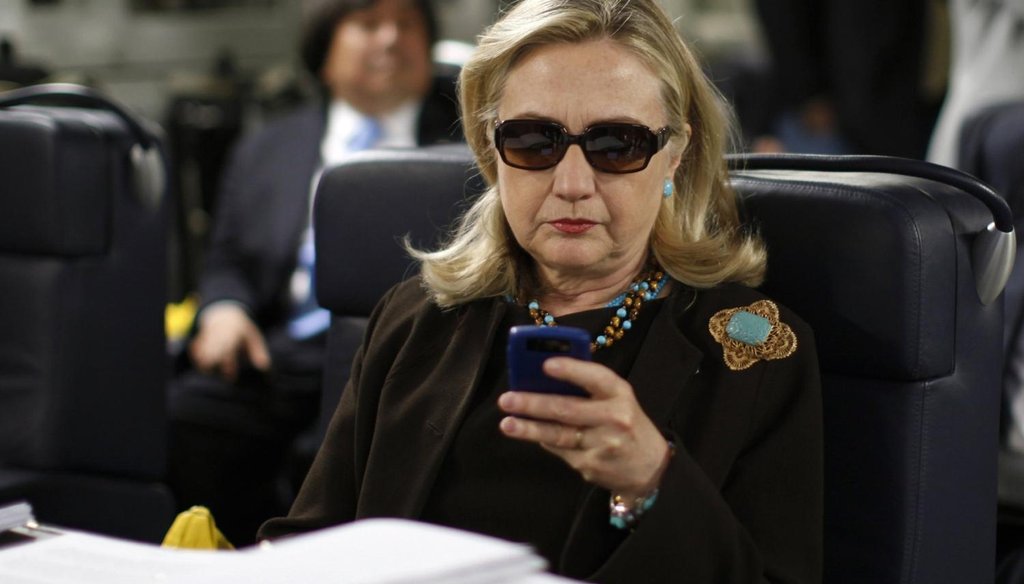Get PolitiFact in your inbox.

Hillary Clinton continues to face criticism for using a private email during her time as Secretary of State.
With Hillary Clinton making her presidential run official, Republicans from Mitt Romney to Kentucky Sen. Rand Paul jumped at the chance Sunday to revisit Clinton’s biggest controversies from her tenure as secretary of state.
We fact-checked claims from both Republicans.
We’ll take Romney first. On Fox News Sunday, Romney said Clinton deleted emails that were subject to review by Congress.
"You've seen in polls and in discussions across the country a feeling that Hillary Clinton is just not trustworthy," Romney said on Fox News Sunday. "This whole story about her having erased all of her emails even though they were subject to recall and review by Congress, i think that's made people remember that with the Clinton's it's always something."
That claim rates Mostly False.
Romney’s claim contains two errors. First, Clinton did not erase all her emails.
In March, the public learned that instead of using a State Department email account when she was in charge, Clinton conducted email through a private server in her New York home. When State Department officials asked for copies of her government-related emails late last year, Clinton’s staff went through her files and sent over about 30,000 emails. According to Clinton, about an equal number of emails were judged to be personal and were erased.
Romney’s second mistake is using the phrase "recall and review by Congress."
Congress plays no role at all in deciding what materials should be preserved when an official leaves office, said Jason R. Baron, a lawyer at Drinker Biddle and Reath and a former director of litigation at the National Archives and Records Administration.
"This is an executive branch function," Baron said. "In most agencies when a senior official leaves, there is a protocol to review the documents that the official might have. The Federal Records Act doesn’t expect Congress to review anything."
Congress does have the right to subpoena records as part of an investigation, and congressional committees have been investigating the deaths at the American compound in Benghazi, Libya. This might be what Romney had in mind. But if he did, that makes his point even harder to prove.
"Clinton has stated that she turned over to the State Department any records responsive to congressional subpoena at the time," said Douglas Cox, a law professor who specializes in government records law at the City University of New York. "An allegation that she destroyed records subject to subpoena is a serious one, and it is speculative absent more specific evidence."
Paul, meanwhile, was asked on CNN for an example of Clinton being successful as Secretary of State. He answered by pointing out her failure in Libya.
"I think really that the issue in Benghazi is an enormous issue because it's the one, as commander-in-chief, she would be there for the 3:00 a.m. phone call. I think Benghazi was a 3 a.m. phone call that she never picked up," Paul said.
"She didn't -- she didn't provide the security, not just that day, for nine months. Dozens and dozens of requests for more security, all completely ignored by Hillary Clinton."
That claim rates Half True.
Paul’s claim that Clinton herself ignored a litany of security requests for the Benghazi outpost does not completely check out, though it is true that the U.S. diplomats in Libya had warned of insufficient protection and the deteriorating climate in eastern Libya in the months ahead of Stevens’ death.
The accuracy of his claim comes down to this: There is no hard proof that Clinton "completely ignored" "dozens and dozens" of requests for more staffing.
Still, there is smoke.
Clinton’s reason for not responding to requests from U.S. diplomats in Libya outlining the need for enhanced security staffing was simple: The requests did not make it up to her through the chain of command, she has said.
To critics like Paul, Clinton assumes responsibility for what went wrong during her four years at secretary of state regardless of whether she was informed.
"Did the State Department, under Secretary of State Hillary Clinton's leadership, deny the request for additional security? The answer is yes," said Paul spokesman Eleanor May.
Experts say we may never know what Clinton knew about the security shortfalls in Benghazi, which officials envisioned as a temporary outpost to monitor eastern Libya’s nation-building efforts after the collapse of the Moammar Gadhafi regime.
Paul may also be overstating by saying there were dozens and dozens of requests for security, experts told us. We found several examples but not as many as Paul suggested Sunday.
"I would be suspect of anyone making firm conclusions one way or another," said Richard Brennan, a senior political scientist and expert in Middle Eastern affairs at the RAND Corporation.
Our Sources
See individual fact-checks.


















































